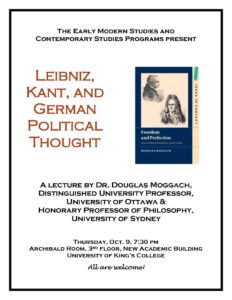 The public is invited to a lecture by Dr. Douglas Moggach, Distinguished University Professor, University of Ottawa, & Honorary Professor of Philosophy, University of Sydney. Presented by the Early Modern Studies and Contemporary Studies Programs.
The public is invited to a lecture by Dr. Douglas Moggach, Distinguished University Professor, University of Ottawa, & Honorary Professor of Philosophy, University of Sydney. Presented by the Early Modern Studies and Contemporary Studies Programs.
This talk contrasts two kinds of perfectionist political thought in the 18th and 19th centuries. The older form, associated in the German Enlightenment with Leibniz and Christian Wolff, aims at the promotion by the state of the ‘good life’, the physical, intellectual and spiritual thriving of its subjects. A second form emerges through Kant’s critiques of this older perfectionism as heteronomy (misconceiving the ends of moral/political action as based on happiness rather than autonomy) and as debilitating paternalism. Kant’s adherents, including Schiller and Fichte, develop these criticisms into a new, post-Kantian perfectionism, predicated on the idea of rightful interaction among self-defining individuals, and on maintaining and enhancing the conditions for free activity. Hegel, the Hegelian School, and Marx variously exemplify this new approach. Leibnizian influences do not disappear, though. Underlying these theoretical developments are re-interpretations of Leibniz’s political thought, particularly the relations among freedom, justice, and progress.
